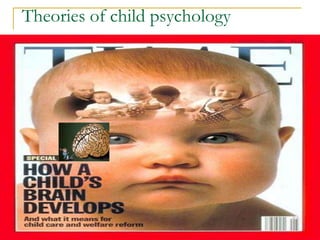
Theories of child psychology
- 1. Theories of child psychology
- 3. IMPORTANT THEORIES – PSYCHODYNAMIC THEORIES – Psychosexual theory – Sigmund Freud – 1905 Psychosocial Theory – Eric Erickson – 1963 Cognitive Theory – Jean Piaget – 1952 BEHAVIORAL LEARNING THEORIES – Classical conditioning – Ivan Pavlov – 1927 Operant conditioning – Skinner B.F – 1938 Social Learning Theory – Albert Bandura – 1963 Hierarchy of Needs – Abraham Maslow – 1954
- 4. Cognitive theory - Jean Piaget (1984) Cognitive development Jean Piaget
- 5. Sensorimoter period 0-1.5 years Child is cognitively zero at birth piaget explained that The intelligence develops in the following areas
- 8. Developing a mental schemata–child take in new experiences through their own system of knowledgeIt is now known that infants can from the first day of life smell, see,and hear. The first is the area of perception. Even very young infants have the ability of perceiving movement, facial relationships , and colour. Cognitive competence explains how and why an infant explores a nursing Assimilation mother’s fingers and studies her face.
- 9. – Accomodation complement ary process for intelligence to develop child goes on adding newer informations to the original schemata Accommodation
- 10. Equilibration – changing basic assumption following adjustments in assimilated knowledge
- 11. Piaget described that child develop knowledge in the following six stages. Object permanence Causality Symbolic Play
- 12. Object permanence : Objects continue to exist even when they are not perceivable by the child.
- 13. 2.Causality: Objects have uses, and events have causes. Piaget used the term circular reaction (primary, secondary and tertiary) to describe the child’s changes in this area. Primary circular reaction describes recreating an already known satisfying action, such as thumb sucking.
- 14. circular reactions Primary circular reaction learning through already known object
- 15. 4-8 months Secondary circular reactions Recreating of an accidentally discovered cause and effect. Visually follows dropped objects Recreates accidentally discovered environmental effects eg.kicks mattress to shake mobile Bangs ,drops,puts in mouth Responds to own name
- 16. Causality (Tertiary circular reactions -12- 18 months) Reactions involve experimentation, and as one might, such behaviours often exasperate the childs parents. Deliberately varies behaviour to create novel effect.
- 17. 3.Symbolic play: On object can represent another. Another characteristic of thought processes at this stage is animism, investing inanimate objects with life and 12-18months Centered on own body(drinks from toy cup)
- 18. In 1984 , Mussen and co workers noted that there are 4 major areas of cognitive development 1. Area of Perception 2. recognition of Information 3. ability to categorise 4.Enhancement of memory
- 19. 1.Area of Perception Ever young infant have the ability to perceive, movement facial relationship and color .
- 20. 2. Recognition of Information- The child grasps information and develops mental scheme about particular object, these schemes contain some but not all the crucial elements of the object.
- 21. 3. Ability to categorize Children can group things together by way of their shape,color, and use even by the age of 1 year.
- 22. 4.Enhancement of memory Even very young infant have the ability to recall past events and use the information gained to help them to form a reaction to things presently going on
- 23. 2 nd Stage :-Preoperational Period (Jean Piaget) Starts around18- 24months and lasts till 6-7yrs it is divided into intutive preconceptual
- 24. Intutive period Is egocentrism, meaning that the child is incapable of 22.av 23.av i assuming another person's point of view.
- 25. Intutive period features are Generalization eg all that flies are assumed as birds
- 26. Preconseptual period 4-7 years Childs mind is centered Centration:- Process of focusing all thoughts and reasoning of any mental problem on only one aspect of whole of the structure and disregarding all other features
- 27. Period of Concrete Operations. (6- 12 years) An improved ability to reason emerges during this period. The thinking process becomes logical. He develops the ability to use complex mental operations such as additions and subtraction The child is able to understand others point of view and animism declines.
- 28. Period of Formal Operations. At this stage, the child's thought process has become similar to that of an adult, and the child is capable of understanding concepts like health, disease, and preventive treatment.